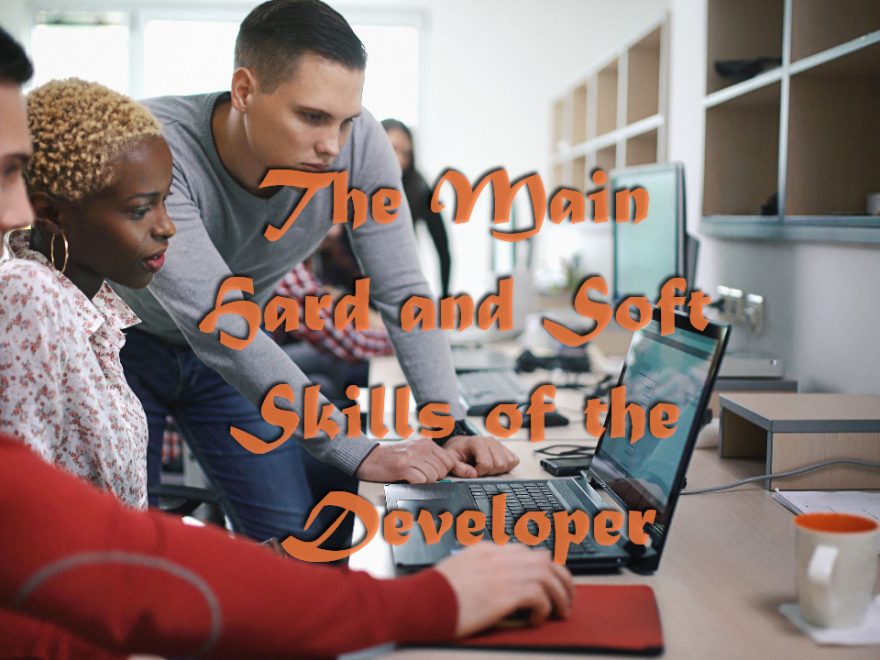Every profession requires certain awareness and expertise in the chosen field. A good position is a decent reason to start developing various skills and competence.
The qualification of an IT specialist includes relevant experience, knowledge (stock of information such as hardware vs software engineering characteristics), and professional skills, the so-called hard skills. Let’s also consider how the list of skills changes as the specialist develops professionally.
Stages of growth of the IT-professional

Each specialist in the IT sphere – a programmer, an analyst, a QA specialist – passes through several growth stages:
Intern (beginner);
Junior (junior);
Middle (middling);
Senior.
What skills do beginners and juniors need?

The first step in a career is considered to be Junior. However, before the future specialist accumulates experience in developing real projects, there is one more step in his history – an intern or just a beginner. Companies mostly work with newcomers at the workshops. A significant part of the audience of the workshops is senior students and graduates of technical specialties.
Junior, in its turn, is a junior, but still a specialist. This person is supposed to know how to write code and handle simple tasks by himself/herself. With medium-complexity tasks – under the supervision of more experienced colleagues. Such a specialist (if we are talking about a programmer) must have a confident knowledge of at least one programming language and be familiar with at least one framework. Yes, his knowledge is not deep. But he must know the basics and have minimal experience. The key soft skill is the willingness to learn.
To grow to a middle specialist and reach a new level of pay for his work, he needs to be deeply immersed in at least one language, and – ideally – pass a certification exam in that language. You need to become familiar with several frameworks at least superficially and study at least one of them in depth. It is impossible to pass to the next stage without experience, gained in real projects.
As a rule, Junior grows into Middle in no sooner than a year, and on average – in 2-5 years. These years are extremely necessary to try different tools in practice, to work on different projects, to get experience in solving problems in real conditions with real people, and to get immersed in the subject area and in the specifics of the business.
Important hard skills:

knowledge of the chosen programming language;
knowledge of at least one framework;
knowledge of IDE and collaborative development tools (Git and/or others);
the ability to search for information in search engines.
Important soft skills:

self-learning skills – most important because the beginner has to learn and learn!
self-discipline and motivation to develop and self-learn.
What skills to develop next

Most IT professionals do not advance beyond the Middle level, and there are several reasons for this. One of them is that as a middle, a specialist is able to solve almost any technical problem in his profile. Yes, in some cases – for example, in architecture development – he may need the help of a senior. However, in most projects, he is able to solve problems on his own. Why develop further, if everything is good as it is?
In addition, at this level, there are already open different ways of development, and not all of them require further technical development. These are the already mentioned roles of mentor, speaker, and presale – a technical expert who helps you launch new projects.
Finally, when you reach the Middle level, you can switch to a vertical career: the role of a team leader, division manager (middle manager), top manager (CTO), or CEO.
If an IT specialist is planning not to stop at this stage, but to develop further, then the answer to the question “What skills to develop?” strongly depends on the growth vector chosen. So, if the specialist is ready to try his hand at team management – to become a team leader, we can talk about the following skills:
– The ability to inspire the team;
– Responsibility;
– The ability to set goals and delegate tasks;
– The ability to plan.
And these are all soft skills. If a specialist chooses to develop toward the senior, the list of skills will be as follows:
– the ability to solve any problems;
– a broad outlook – familiarity with the mass of programming languages, frameworks, tools, tracking innovations;
– the ability to quickly learn new technologies and tools;
– Experience in solving different problems, and working on different projects;
Orientation is not so much to technical problems and solutions, as to the real needs of the customer and users.
Conclusion
In a development career, each next stage requires more from a specialist than the previous one. If an IT graduate comes to an IT company, he can do a test assignment and be selected for a practicum in just a week to get promoted.
He then turns into a Jun in 2-6 months if he has good basic training. A junior becomes a middle in 2-5 years if he works on real projects. A middle may become a senior in 5-7 years, or he may never become a senior if he prefers to develop in other directions.

